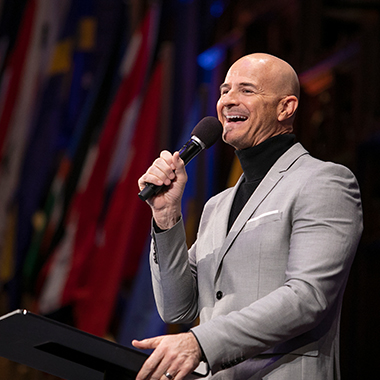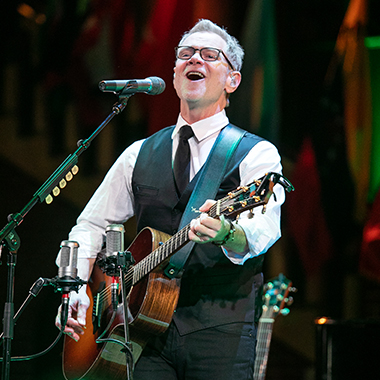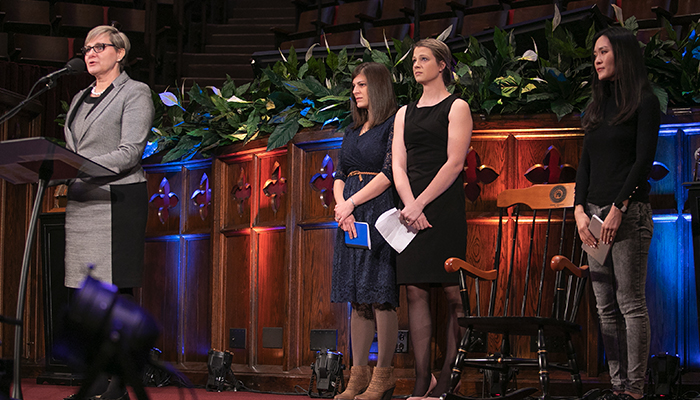About the Author
Kevin Mungons is editorial manager for Moody Bible Institute’s Marketing Communications department. Darrell Goemaat is a Chicago-based freelance photographer.
This site uses cookies to provide you with more responsive and personalized service and to collect certain information about your use of the site. You can change your cookie settings through your browser. If you continue without changing your settings, you agree to our use of cookies. See our Privacy Policy for more information.
DR. MARK JOBE walks into the greenroom right before the final session of Founder’s Week, picking up a copy of the detailed schedule that rules the evening event. At 6:33 p.m. the preparatory meeting starts, at 6:48 the organ prelude, and at precisely 7:03 the lights come up for the official welcome and prayer. The minute-by-minute schedule continues until 8:40, when the sermon ends.
“And I always ask the speakers how they want to end the service,” says Lauren (Downey ’14) Cuevas, the manager who keeps the schedules. Sometimes a prayer, sometimes a song—whatever the speaker chooses. So everyone looks to Dr. Jobe for an answer, only to hear his quick laugh and “I’m not sure.”
“Let’s just see how the Spirit moves.”
Dr. Jobe arrives for the preparatory meeting with his whole family, including wife, Dee, his two sons, daughter, and son-in-law. During Founder’s Week the president traditionally leads in prayer before everyone exits to the auditorium, but tonight marks his first official Founder’s Week sermon and it seems awkward for him to pray for himself, so a coterie of trustees and vice presidents have also stopped by, and now the room feels crowded.
“I went into Friday night’s meeting with high expectations,” Greg Thornton ’81 says later, explaining how the event planning began well before Dr. Jobe’s appointment as president. In fact, tonight’s speaker was the last detail to fall into place. The Alumni Association had already moved its traditional Alumni Day activities to Friday, and Steven Curtis Chapman agreed to lead Friday’s worship. Then the alumni board selected the Alumnus of the Year recipient, and word quietly leaked out that Friday’s announcement was a special surprise—multiple honorees.


A feeling of “something’s different” started earlier in the week, ignited by a running joke about the necktie that Dr. Jobe did not wear on Monday. Roy Patterson ’81 noted the omission and predicted it would continue (“I’ll bet you $100,000 he doesn’t wear one all week,” which proved to be right). Founder’s Week is the oldest Bible conference in the country, steeped in its own traditions, including neckties. And now Dr. Jobe has arrived in the greenroom with a modern-cut suit and snappy black turtleneck, provoking a few more friendly jabs. Someone had just run into Steven Curtis Chapman, who was wearing a white shirt and tie. That’s right. The only guy wearing a tie was the Christian rocker, go figure.
While Dr. Jobe stands waiting, a few smaller details stand out, like the two wristbands he wears. One reads “BE HERE NOW,” from a sermon about our distracted society. The other wristband says “BE THE CHANGE,” a reminder that transformation starts with one person. Actually, he’s not expecting anyone to notice the wristbands—he intends them as personal reminders. But in a final bit of foreshadowing, one more detail could be noted. He’s not wearing a wristwatch.
At Founder’s Week, very few speakers have enough gravitas to suspend the printed schedule. It happened once last year, the first time in recent memory, when Anne Graham Lotz spoke with the passion of her father, Billy Graham. What Moody needed was an old-fashioned prayer revival, and she called one down, putting lunch on hold.
Truth be told, she was right. Moody needed a prayer revival. The year had been difficult, marked by a significant leadership transition, the closure of a campus, plus faculty and staff layoffs. After a good deal of public reaction, it was tempting to offer quick answers. But interim president Greg Thornton took a different path, saying “God has us where He wants us—humbled, praying, and listening.”
By the time Founder’s Week rolled around, campus leaders had spent a quiet year of praying and listening. The feeling of “something’s different” was real, and not just about neckties. Moody would remain true to its roots.

WHEN THE SERVICE BEGINS, the auditorium is nearly full, re-creating the annual vibe that makes this event famous. People say the “Historic” Moody Church so often that it seems like part of the church’s name, and a surprising burden for anyone who tries to speak here. They’ll stand on the same spot where evangelical leaders have preached for nearly a hundred years. They’ll clear their throats and look up at the famous horseshoe-shaped balcony, then the distracting wave of institutional history hits full force. It happens to everyone who stands here—you can see it in their eyes, right when they step behind the pulpit—the past cannot be ignored. But for preachers, the weight of “Remember Back When” can feel like the enemy of “Be Here Now,” especially when calling for spiritual decisions right now, today.
“At heart I am an evangelist,” Dr. Jobe said earlier, speaking at the annual Alumni Association banquet. He says it again tonight, as if to stake out new territory—or old territory, depending on how you look at it. As a graduate, Dr. Jobe understands the various ways Moody presidents have positioned themselves: educators, theologians, pastoral leaders, administrators. Each president brings his own gifts to the job, making unique contributions for a given era. But if you reach back in history, one fact leaps out. Several of the presidents described themselves as evangelists. Especially the first one.
Steven Curtis Chapman feels this history as soon as he hits the platform, immediately looking up and mentioning the “great cloud of witnesses” who have stood here before. “There’s a lot of history there for me, and a lot of my story is woven in and out of Moody’s story,” he says later. “It was a sweet night to come and get to celebrate because I’ve been in a season of remembering my own story, and God’s faithfulness in directing my life.”
Soon after his debut album in 1987, Chapman visited Moody for the first time. For anyone who might have forgotten those early years, a student now stands near the back, vigorously waving a vintage Steven Curtis Chapman poster—the glamor-boy with a mullet, back in the day. Thirty years fly by, and now he’s the middle-age guy with a tie, standing alone with a guitar, leading off with an old gospel song that he learned as a boy in Paducah, Kentucky:
Turn your eyes upon Jesus,
Look full in His wonderful face.
Without realizing it, he’s chosen a beloved Moody song, written by Helen D. Lemmel, who once taught voice here. Who knows—without stretching the story too much, she probably stood on the same spot, too. Somehow Chapman has chosen the perfect song to get everyone singing together. By the third line everyone has found their seats and joined in: And the things of earth will grow strangely dim. The words set the mood for what follows, a tacit warning that the event will stray from the printed schedule as “Be Here Now” takes over.
A few minutes later Chapman launches into one of his own songs, not yet understanding how significant the choice will be. “It just seems appropriate, certainly because of the life of D. L. Moody and so many others,” he says, then sings:
We will abandon it all,
for the sake of the call.
No other reason at all,
but the sake of the call.
Chapman did not know that Nancy (Andersen ’80) Hastings was about to present the Alumni of the Year award to three Moody aviators who were “wholly devoted to live and to die—for the sake of the call.” Was this a well-timed coincidence? Or had Dr. Jobe been closer to the truth: “Let’s just see how the Spirit moves.” At any rate, the song provided the perfect introduction to three poignant testimonies about Andrew Trouten ’15–’18, Joochan Lee ’15–’18, and Diego Senn ’10.
“They did not labor in vain, nor did they die in vain,” announced Naomi (Williams) Senn ’12, wife of Diego. “The cost is high and the risk is great, but the kingdom investment cannot be matched.” Her thoughts were echoed by Rebecca Trouten, wife of Andrew, and Austen Lee’s older sister, JooEun Rose Lee. Each testimony passed through moments of profound grief—unavoidable, really—yet ended with powerful messages of hope.

Nancy Hastings presents the 2019 Alumnus of the Year Award
AS MARK JOBE begins his sermon, he’s faced with a preaching dilemma. The “preliminaries” of the service have exceeded their budgeted time, so maybe his four-point sermon should be cut to three. Or two points, if the schedule gets really tight. After all, there’s the live radio broadcast to consider, and television. Having chosen James 1:19–25 as his text, he wanted to affirm the conference theme, the inspiration and authority of Scripture. And if he stops right there, everyone will be happy and comfortable.
But tonight is not about comfort. “The Word brings about change,” Jobe says, then plows into a surprise illustration: “This is a last-minute thing and I’m throwing the conference planners all into a tizzy . . . but . . .”
Until now, no one has paid much attention to 21 people sitting near the front in matching blue T-shirts. They represent more than 400 who have come to Christ at the multisite New Life Community Church in Chicago, and now Dr. Jobe invites them to the platform for personal introductions.

“Birthed by the Word!” he shouts after each name—calling them “Exhibit Number One of the power of the Word.” Given the electrifying effect of these testimonies, one might call it a powerful conclusion to his sermon.
“But I’m just on my first point,” Dr. Jobe says (and for the record, it is 8:40 p.m., when his sermon is supposed to end). He continues with two more points, offering no hint of a condensed version, and ends up preaching for a full hour. And no one notices.
“I had a fourth point but I’m going to skip it because of time,” he says. Then a student shouts down from the balcony: “Keep going!” and he does, delivering the most challenging words of the evening.
“I’m glad you want to change the world, but if you are getting drunk and sleeping with your girlfriend, don’t tell me how good your acts are—that’s not a spirituality that God embraces. And on the other hand, if you study the Word and have Bible studies, but you have no compassion for the hurting and the broken, the needy, the orphan, and the widow—then there’s something wrong with your spirituality, just as much.”
Though Dr. Jobe started the night a bit unsure of his closing, the service can only end one way now. Not with a cursory every-eye-closed prayer, no. “If you can’t admit that you need prayer while here at Founder’s Week,” he says, “you probably aren’t going to do anything about it when you walk out of these doors.” He brings Steven Curtis Chapman back up and asks for an invitation hymn, even though it messes with the pre-selected song list. “Are you good with this?”
“Absolutely,” Chapman says, and then quietly to Dr. Jobe, “I’m with you, brother.”
“I’m old school,” Chapman explains later, confessing that he doesn’t know a lot of the current worship songs. “The hymns, for me, there’s so much theology and depth and richness that I love keeping those alive, and I often weave those into what I’m doing.” So he scraps the PowerPoint slides and switches to “I Surrender All,” drawing on institutional memory and an old idea.
“Singing could do as much as preaching to proclaim God’s Word,” D. L. Moody once said.
And now a singer stands with his guitar, channeling all of the memories and the truth, singing like Sankey when the new Moody comes to preach.

MEN AND WOMEN, young and old, they all come streaming down the aisles, even from the farthest reaches of the balcony. One is tempted to say “Just like the old days,” except this is now, not history.
Outside the Moody Church auditorium, Chapman’s bus is already warming up. He was supposed to be on the road by now—tomorrow’s concert is in Florida, and he’ll need to run straight to the bus after he leaves the platform. But he keeps singing a bit longer and then offers his own benediction: “I love when the Holy Spirit decides to change our plans. The Holy Spirit does not wear a watch, clearly!”
A few days later, Chapman looks back on the memorable evening and elaborates. “I love when God decides to show up and says, ‘I’ll take charge now.’ That is what is amazing, watching the mystery—the Holy Spirit blows like the wind! It reminded me of my own history, the years of doing that at a Billy Graham crusade or my home church. That was really special and I was grateful to be a part of it.”
The event also provokes a good bit of in-house introspection, as the old-timers ask each other—“Have you ever seen a Founder’s Week like this?” Though Greg Thornton is not generally given to hyperbole, he calls it extraordinary, no small tribute from a man who has attended Founder’s Week for the past 40 years. “Dr. Jobe is very much like D. L. Moody in his passion for souls,” he says.
One more affirmation comes from Don Quass and his wife, Betty, who have attended Founder’s Week every year since 1967.
“You know what? I have never seen anything like that in the fifty years I’ve been at Moody,” Don says. “We’ve always felt the Spirit of God at Founder’s Week without a question, but it was so unusual on Friday. When you can’t explain something, you can only attribute that to the Spirit of God.”
Watch Dr. Mark Jobe’s 2019 Founder’s Week sermon on YouTube.
Kevin Mungons is editorial manager for Moody Bible Institute’s Marketing Communications department. Darrell Goemaat is a Chicago-based freelance photographer.